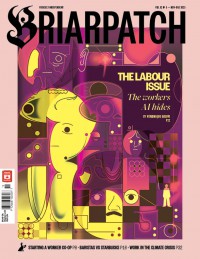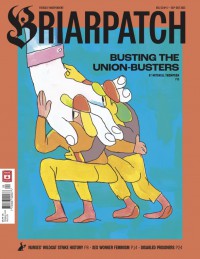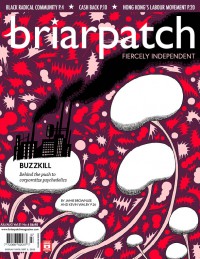-
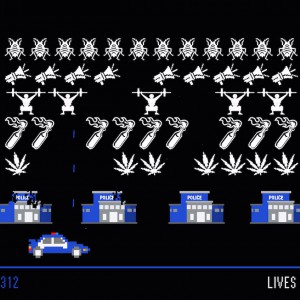 Magazine
MagazineThe myth of police as “embattled heroes”
The Winnipeg police union says officers are constantly under attack by everything from “gang members” to video games to bedbugs. It’s a strategy to persuade the public that the only solution is more police and more money.
-
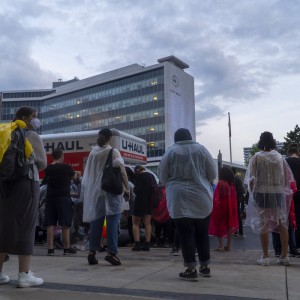 Magazine
MagazinePolice and property
The theme of property – and the vision of a world no longer organized by its logic – is one that is threaded through most of the stories in this issue.
-
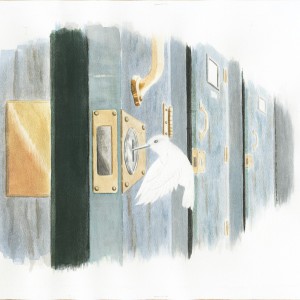 Magazine
MagazineCosmetic change is not prison reform
“Prison reform” is an empty promise from politicians and corrections departments who have a vested interest in maintaining the status quo.
-
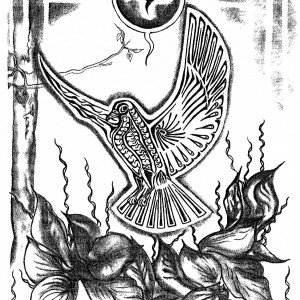 Magazine
MagazineGuilty until proven innocent
Living on remand, it’s important to know how to fight for your rights when the justice system breaks its own rules.
-
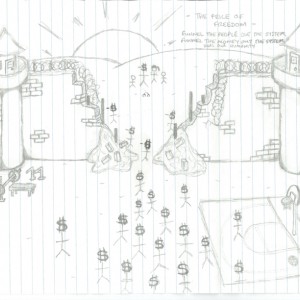 Magazine
MagazineEvidence of an unjust justice system
Governments criminalize poor people, and then allow companies to exploit prisoners’ basic needs for profit.
-
 Sask Dispatch
Sask DispatchYouth access to justice
Are young defendants being provided with the legal information and advice they need to navigate the court system in Saskatchewan?
-
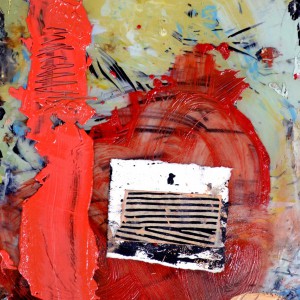 Magazine
MagazineInfiltrated!
When the Indigenous Peoples’ Solidarity Movement of Ottawa was infiltrated by a police officer, organizers were left feeling betrayed and paralyzed. How did they rebuild and strengthen their movement?
-
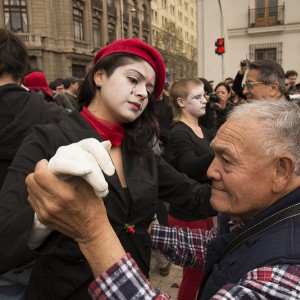 Magazine
MagazineRemembering the disappeared
With a series of marches, conferences, plays, exhibits, and performances, tens of thousands of Chileans marked last week’s 40th anniversary of the coup that ended the presidency of Salvador Allende and ushered in the dictatorship of Gen. Augusto Pinochet.
-
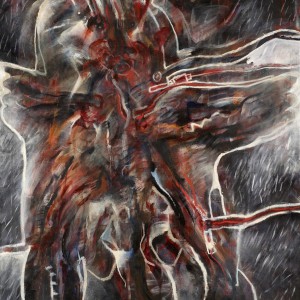 Magazine
MagazineDown in a Hole
This is the kind of place where Ashley Smith died in 2007. It is also the kind of place where Julie Bilotta gave birth on a cement floor last year.
-
 Magazine
Magazine“Dreams are the worst right now”
After a decade of captivity, Omar Khadr, the first child ever convicted of a war crime, became the last Western citizen to be repatriated out of Guantanamo Bay.
-
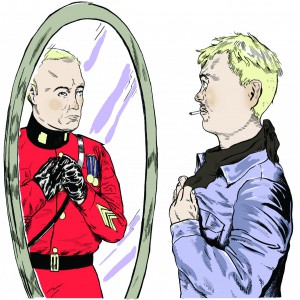 Magazine
MagazineLiving among us
On June 26, 2010, while the G20 summit was under way amid mass protests on the streets of downtown Toronto, a startling revelation was made that would reverberate through activist communities for months to come. Two undercover police officers had joined protest groups and been living among activists as part of a large-scale investigation that began more than a year earlier, in April 2009.
-
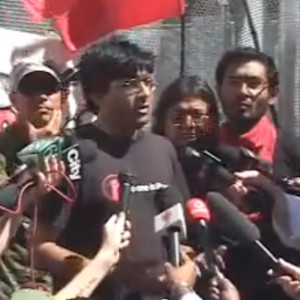 Magazine
MagazineThe Jaggi Singh trial
Ideas are being put on trial in Canada. This became clear sitting in the courtroom at Toronto’s Old City Hall on Thursday, April 28. Jaggi Singh, one of the nation’s most prominent anti-capitalist activists, pleaded guilty to urging people to take down the $5-million G20 summit fence erected in downtown Toronto last June.
-
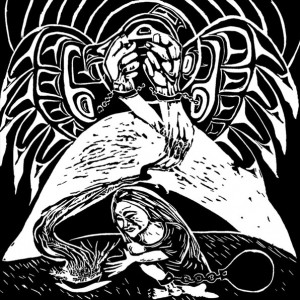 Magazine
MagazineCriminal (in)justice
Gillian Balfour is the author of two important books addressing racism and incarceration in Canada, including Criminalizing Women: Gender and (In)Justice in Neoliberal Times, which she co-edited with Dr. Elizabeth Comack. She is an associate professor in sociology at Trent University in Peterborough, Ontario, specializing in areas of violence against women and the incarceration of Indigenous women in Canada.
-
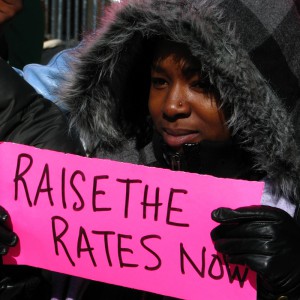 Magazine
MagazineDignity and solidarity
The G20 summit held in Toronto this June closed with a commitment to “fiscal consolidation” from the world’s economic leaders. Among the strongest proponents of slashing public spending was Canada’s Minister of Finance Jim Flaherty. For many of those protesting the G20 on the streets of Toronto, the subtext of Flaherty’s austerity agenda was well understood: a continuation of the attack on access to housing, health care, education and welfare, among other social necessities.
-
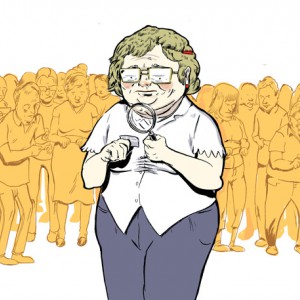 Magazine
MagazineDiscipline and punish
The dream of a benevolent welfare state may live on in social work theory, conference papers and mission statements, but as far as front-line bureaucracy goes, welfare is dead. Only its image remains, as faint as chalk on a sidewalk. No longer even pretending to be a right or social safety net, social assistance has mutated into a series of manipulative tactics to prod and intimidate its clients into jobs that no one wants. In other words, welfare has become workfare.
-
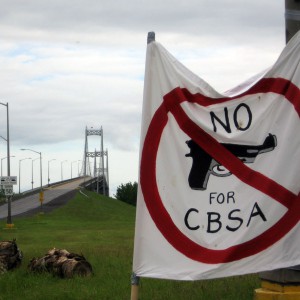 Magazine
MagazineA border runs through it
At midnight on May 31, 2009, the guards who manned the Canada Border Services Agency (CBSA) station on the Mohawk (Kahnienkehaka) reserve of Akwesasne, near Cornwall, Ontario, abandoned the Canadian side of the U.S.-Canada border and went home. The guards were to be issued 9-mm Beretta pistols on the following day as part of Canada’s border security policy, but had been warned by Akwesasne community groups that armed agents of the Canadian government would not be tolerated on their land.
-
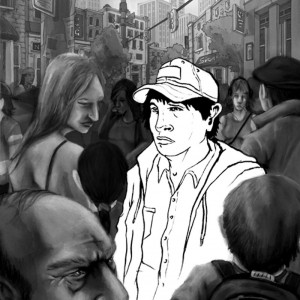 Magazine
MagazineLetters across borders
Authman and Zidan Mushtaak are Pakistani nationals who moved to the United States 15 years ago, as children. Though they now live less than 800 kilometres apart, Authman and Zidan have been separated for the past three years by an impenetrable, invisible line created by Canadian and U.S. immigration laws. The following is a series of emails exchanged between the brothers.
-
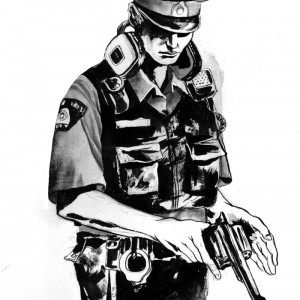 Magazine
MagazineLetter from the editor
Crime dominates the news, but the standard political pronouncements on the subject seldom move beyond empty, knee-jerk vows to “get tough” on the perpetrators. This approach to the issue only stokes the politics of fear, of blame, of poor-bashing and insidious racism. An obsessive public focus on the bogeyman of “crime” serves the interests of right-wing politicians very well indeed: more police for the poor, fewer regulations for the rich, less money for the universal social safety net.
-
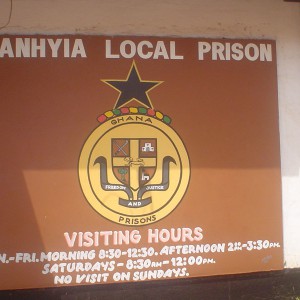 Magazine
MagazineThe detestable solution
Under colonial rule, Ghana’s multiple traditional systems of justice were replaced by a single, expensive, incarceration-based penal system. Now, 52 years independent and among the poorest 15 per cent of nations, Ghana is at the mercy of foreign countries for financial support in maintaining its overcrowded prisons, retraining prison staff and educating prisoners in an effort to upgrade a system of punishment that is falling into disfavour in the wealthier nations from which it originates.
-
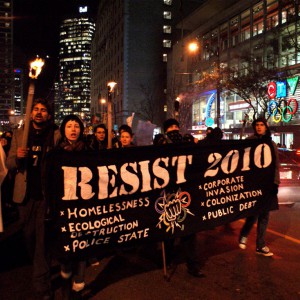 Magazine
MagazineClass-war games
On February 12, 2009, exactly one year before the opening of the 2010 Winter Olympics in Vancouver and Whistler, the grim future of political freedom in British Columbia was on full display. Military and police flanked by helicopters rehearsed manoeuvres in Vancouver, where escalating harassment, intimidation and surveillance of activists had already begun.

